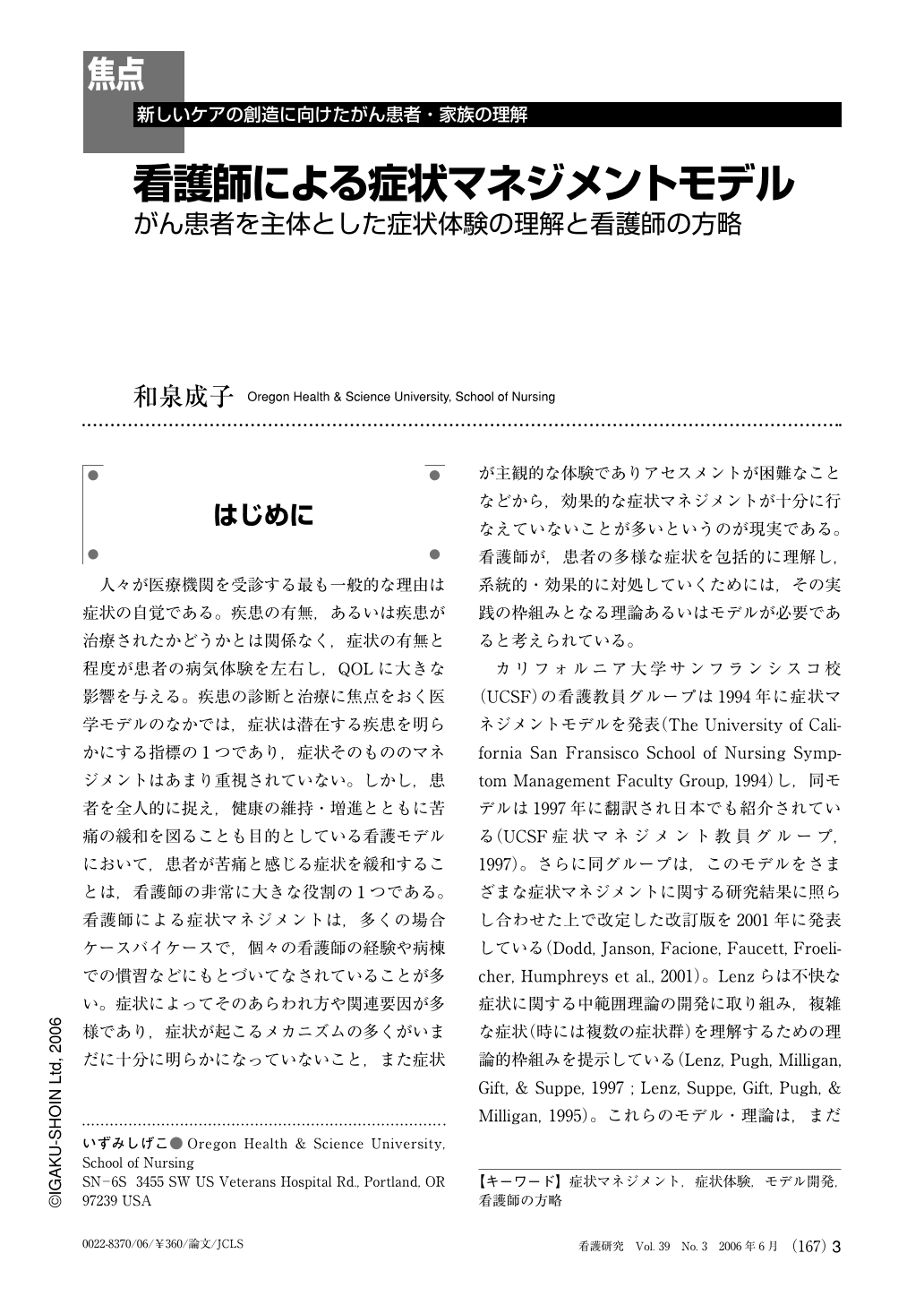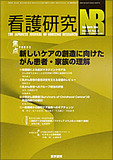Japanese
English
- 有料閲覧
- Abstract 文献概要
- 1ページ目 Look Inside
- 参考文献 Reference
- サイト内被引用 Cited by
はじめに
人々が医療機関を受診する最も一般的な理由は症状の自覚である。疾患の有無,あるいは疾患が治療されたかどうかとは関係なく,症状の有無と程度が患者の病気体験を左右し,QOLに大きな影響を与える。疾患の診断と治療に焦点をおく医学モデルのなかでは,症状は潜在する疾患を明らかにする指標の1つであり,症状そのもののマネジメントはあまり重視されていない。しかし,患者を全人的に捉え,健康の維持・増進とともに苦痛の緩和を図ることも目的としている看護モデルにおいて,患者が苦痛と感じる症状を緩和することは,看護師の非常に大きな役割の1つである。看護師による症状マネジメントは,多くの場合ケースバイケースで,個々の看護師の経験や病棟での慣習などにもとづいてなされていることが多い。症状によってそのあらわれ方や関連要因が多様であり,症状が起こるメカニズムの多くがいまだに十分に明らかになっていないこと,また症状が主観的な体験でありアセスメントが困難なことなどから,効果的な症状マネジメントが十分に行なえていないことが多いというのが現実である。看護師が,患者の多様な症状を包括的に理解し,系統的・効果的に対処していくためには,その実践の枠組みとなる理論あるいはモデルが必要であると考えられている。
カリフォルニア大学サンフランシスコ校(UCSF)の看護教員グループは1994年に症状マネジメントモデルを発表(The University of California San Fransisco School of Nursing Symptom Management Faculty Group, 1994)し,同モデルは1997年に翻訳され日本でも紹介されている(UCSF症状マネジメント教員グループ,1997)。さらに同グループは,このモデルをさまざまな症状マネジメントに関する研究結果に照らし合わせた上で改定した改訂版を2001年に発表している(Dodd, Janson, Facione, Faucett, Froelicher, Humphreys et al., 2001)。Lenzらは不快な症状に関する中範囲理論の開発に取り組み,複雑な症状(時には複数の症状群)を理解するための理論的枠組みを提示している(Lenz, Pugh, Milligan, Gift, & Suppe, 1997 ; Lenz, Suppe, Gift, Pugh, & Milligan, 1995)。これらのモデル・理論は,まだ検証段階にあるといえるが,症状を包括的に理解し,より効果的に症状マネジメントを行なうための研究や実践に方向性を与える役割を果たしている。
しかし,Lenzらの理論は症状そのものを理解するための理論であり,症状マネジメントの方略に関して直接的な枠組みを提示するものではない。また,UCSF症状マネジメントモデルは,症状マネジメントの主体が患者を含む多職種の医療チームメンバーのいずれである場合でも適用できるようにデザインされているため,看護師の実践的視点に焦点化されているわけではない。本稿では,UCSF症状マネジメントモデルとLarsonによる症状マネジメントにおける看護師の役割に関する論文(ラーソン,1997)をもとに試作された,看護師・看護学生が症状とそのマネジメントを系統的に理解し症状マネジメントに関する看護実践および看護研究に適用できるモデルを提案する。
Symptoms are a heavy burden for persons who are experiencing them. The symptom affects many aspects of a person's life. Yet, since symptoms are subjective sensations, it is difficult for others to understand the symptom experience. Because of the subjectivity and multidimensionality of symptoms, effective symptom management is a challenge for nurses as well as for the person who is experiencing it. In this article, a Symptom Management Model for Nurses is proposed. This model is based on the Symptom Management Conceptual Model by UCSF Symptom Management team (1994, 2001) and modified to reflect nurses' roles in symptom management (Larson, 1997).From a nursing perspective, nurses need to understand the entire symptom experience. The symptom experience includes not only how a patient perceives the symptom but also the outcomes of having the symptom. Various aspects of symptom experiences are delineated with cancer related literature. In order for symptom management strategies to be successful, nurses need to 1) have scientific and experiential knowledge about the symptom and its mechanisms to identify therapeutic interventions, 2) understand the person's symptom experience by listening, questioning, and observing, and 3) provide interventions to support self care. The applications of this model to nursing practice, education, and research are discussed.

Copyright © 2006, Igaku-Shoin Ltd. All rights reserved.


